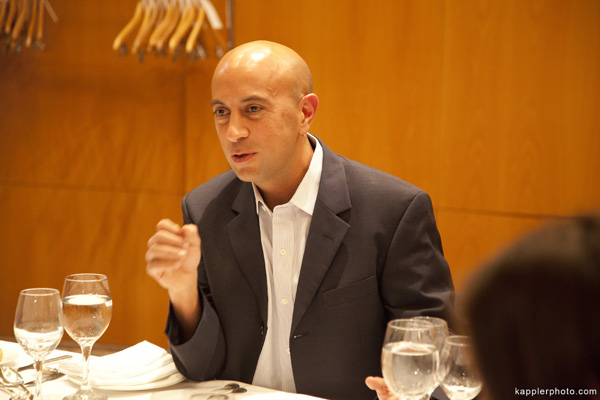Australia/Israel Review
“Recognisers” need to recognise reality
Sep 7, 2017 | Gareth Narunsky

Gareth Narunsky
Recent Australian Labor Party and parliamentary motions to immediately recognise “Palestine” will have zero impact on the lives of Palestinians, leading Israeli journalist Avi Issacharoff told an Australia/Israel & Jewish Affairs Council media lunch in Sydney recently.
Jerusalem-born Issacharoff is Middle East analyst for both the Times of Israel and Walla, has co-written two books on the Arab-Israeli conflict, and is the co-creator of the hit Israeli television series Fauda. He is a frequent current affairs commentator on Israeli television and radio and lectures on modern Palestinian history at Tel Aviv University.
Addressing the group of senior journalists in early August, he said of the recognition motions: “The example I give is, someone from the Balata refugee camp near Nablus, and I would say that this is relevant for each and every one [Palestinian] – it’s not going to change his status.
“It’s not going to get closer to the idea of really living in an independent state, in a two-state solution, but the opposite.
“It’s not going to turn the situation on the ground, it’s not going to help anyone except for maybe some Australian parliament member who’s looking to do something for his own benefit.”
On a regional level, Issacharoff said Israel has never been more secure, with both known and clandestine security coordination with its neighbours at its highest level ever.
He said security coordination with the Palestinians was also ongoing.
“During the last crisis on the Temple Mount the security coordination was at its best ever,” he said.
“These are things which we don’t hear about in the news but the security coordination was very, very close … there were meetings between Israeli and Palestinian officials every day.”
He added that “hundreds of attacks in a year are prevented by the Palestinian security forces.”
This coordination is also vital in securing the Palestinian Authority against the Hamas threat in the West Bank.
“The Palestinian Authority, at least pre-the last crisis, if you would ask them off the record what is their number one enemy they would say first of all it’s Hamas, then we need to deal with Israel,” he said.
“Hamas wants to topple the Palestinian Authority in the West Bank and they know that the best way to do that is to do all kinds of attacks against Israeli targets in order to stop the security coordination. They know that it will weaken dramatically the Palestinian Authority, and, by that, they hope it will allow wide mass demonstrations against the Palestinian Authority as well. And in a way would lead to the fall of the Palestinian Authority.”
As far as Gaza is concerned, he said Israel is the only party acting in the interest of civilians there.
“Hamas invested hundreds of millions of dollars in the last decade, not in improving the interior situation in Gaza, but in improving their military wing,” he said.
“The Palestinian Authority is the one that now stopped paying the electricity bill of Gaza. The Palestinian Authority is the one that stopped paying the water bill of Gaza. The Egyptians are the ones that area blocking Gaza from their side for the last decade or more.
“So if you look at the situation on the ground, you cannot escape the conclusion that yes, the only entity that cares about the health, about the electricity, about the water, about so many different things in Gaza is the State of Israel.”
The “biggest myth” invented by Hamas was that of an Israeli siege, he added.
“There’s around 900 to 1,000 trucks of goods that every day are passing from the Israeli side to the Palestinian side, knowing that it will help Hamas to survive but understanding that the people of Gaza need these goods in order to survive,” he said.
Avi Issacharoff was in Australia as a guest of WIZO.
Tags: Israel






